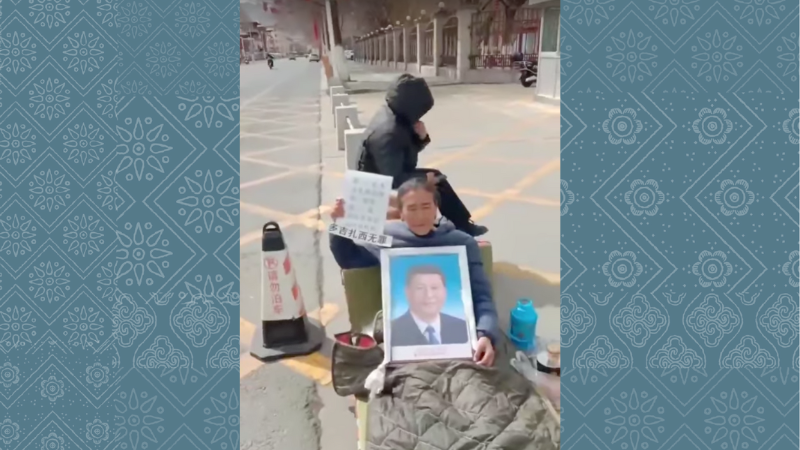During state-orchestrated celebrations for Xi Jinping’s second visit to Lhasa, marking the Tibet Autonomous Region’s 60th anniversary, Chinese authorities deployed significant security forces to project stability and harmony.
As in previous instances, Tibetan activists and individuals perceived by the authorities as undermining the state’s image have faced restrictions on their movement or have been barred from entering Lhasa. The ordeal faced by the family of imprisoned Tibetan businessman Dorjee Tashi exemplifies the broader climate of heightened security and control.
Frustrated with persistent surveillance and repeated obstruction of her rights, Gonpo Kyi, elder sister of Dorjee Tashi, attempted to commit suicide by jumping from the second floor of her brother’s Yak Hotel in Lhasa on 20 August. She reportedly survived the fall but sustained serious injuries to her leg and back.
Gonpo Kyi has been leading a persistent campaign advocating for the release of her brother, Dorjee Tashi, who has been serving a life sentence in Lhasa’s Drapchi Prison since 2008 on loan fraud charges widely regarded as politically motivated and allegedly fabricated by corrupt local officials after he refused to comply with their demands for luxury favors. Dorjee Tashi has consistently maintained his innocence, even under torture during interrogation in pre-trial detention.
After exhausting all official avenues to seek justice for her brother, Gonpo Kyi and her family began openly advocating for his release in June 2022. Since then, she has repeatedly staged sit-ins in front of the People’s Court of the Tibet Autonomous Region in Lhasa. Her activism has been met with repeated repression, including physical assaults, periods of detention and house arrest.
Appealing directly for intervention from China’s top leader to defend justice, Gonpo held a large portrait of Xi Jinping during one of her sit-ins in front of the gate of the Higher People’s Court in Lhasa on 20 February 2024.

While Gonpo Kyi was held in confinement during Xi’s visit, authorities restricted the freedom of movement of Dorjee Tashi’s brother, Dorjee Tseten, confining him to Lhoka (Shannan) prefecture, south of Lhasa, and barring him from returning to the city.
On August 18, when Gonpo tried to leave the Yak Hotel to appeal visit to her imprisoned brother, security officers forcibly returned her and confined her there.
In a video recorded the following day, 19 August, she is seen approaching a gate guarded by several plainclothes Chinese police officers surveilling her. She states that her right to visit her brother is being systematically obstructed.
Frustrated by the repeated obstruction of her rights and restrictions on her movement, she attempted suicide by jumping from the second floor of the Yak Hotel on 20 August.
Amid Xi Jinping’s second visit to Lhasa, marking the 60th anniversary of the Tibet Autonomous Region, the denial of rights guaranteed by Chinese law highlights the stark contrast between China’s curated narrative of stability and the harsh repression faced by activists.
Heavy-handed tactics, including pervasive surveillance and large-scale security forces continue to be increasingly deployed across Lhasa and all of Tibet, underscoring China’s determination to project a false veneer of harmony while silencing dissent. By undermining freedoms and reinforcing a climate of fear, the Chinese authorities’ actions highlight the urgent need for sustained international scrutiny of human rights in Tibet.